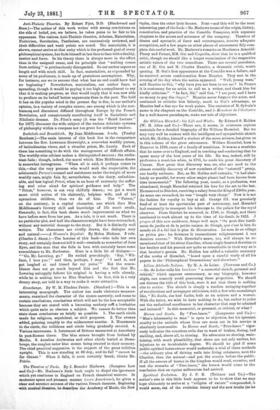The Theatres of Paris. By J. Brander Mathews. (Sampson Low
and Co.)—Mr. Mathews's little book ought to dispel the ignorance which yet continues in England on French theatrical matters. In moderate space and pleasant manner (more Americanc), he gives a clear and succinct account of the various French theatres. Beginning with musical theatres, he describes the Academy of Music, the New Opera, then the other lyric houses. Next—and this will be the most interesting part of the book—Mr. Mathews treats of the origin, history, constitution, and practice of the Comedic Francaise, with separate chapters to the actors and actresses of the company. Theatres of drama and spectacle, of farce and extravaganza, receive adequate recognition, and a few pages on other places of amusement fitly com- plete this useful work. Mr. Mathews's remarks on Mesdames Arnould- Plessy and Paved, MM. Got and Coquelin, show that he is a qualified critic, though we should like a longer examination of the respective artistic values of the two comedians. There are several anecdotes, one of M. Got and M. Charles Maurice, a dramatic critic, worth quoting. M. Got's first appearance at the Comedic was a failure, and he received severe condemnation from Maurice. They met in the evening of the day when the notice appeared. "Well, young man," said Maurice to Got, "why have you not been to see me ? In Franco it is customary for an artist to call on a writer, and thank him for kindly criticism." "In fact, Sir," said Got, "I am poor, and I have no money to pay the claque." Maurice never forgave the actor, and continued to criticise him bitterly, much to Got's advantage, as Maurice had a fine eye for weak points. The omission of M. Sylvain's name in the chapters on the Comedie, and is Monsieur de l' Orchestra for a well-known pseudonym, make our tale of objections.


































 Previous page
Previous page